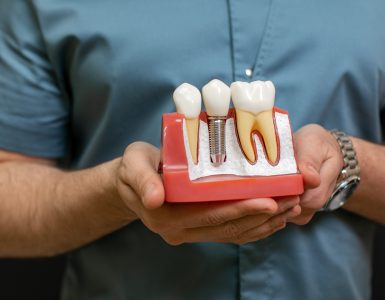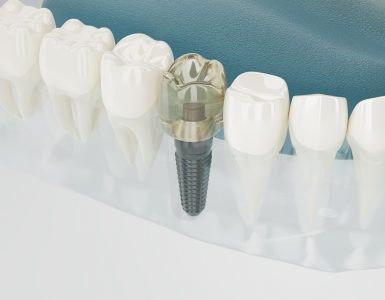More and more people are choosing to have dental implants to replace missing teeth. Naturally blending in with your natural teeth, dental implants offer a durable and long-lasting solution to tooth loss and provide many more benefits than just repairing your smile.
What are the benefits?
- Long-lasting. If you maintain good oral hygiene, your dental implant could last a lifetime.
- Improved oral health. By integrating with your jawbone, chewing will stimulate bone growth just like your natural teeth. They will also support the placement of the surrounding teeth preventing movement and making maintaining your oral hygiene easier. Also, unlike dental bridges, no modification of the adjacent teeth is required in the process.
- Natural looking. Designed to blend in with your natural teeth, they will look and feel like you never lost a tooth.
- Improved facial structure. Tooth and bone loss can affect the shape of your face causing it to hollow and sag. A dental implant can eliminate these changes restoring its shape.
- Improved self-esteem. Missing teeth are often noticed when you smile. Improving your appearing and getting your smile back can have a big impact on your physical and mental health. Tooth loss can also affect your speech patterns, so being able to speak clearly again is great confidence booster.
- Easy to maintain. Treat them as you do your natural teeth with your normal daily brushing and flossing routine.
- Improved diet. Missing teeth can sometimes make chewing certain foods difficult. Because the dental implant integrates with the bone, it has the same bite strength and chewing capacity as your natural teeth.
Are there any risks?
If you have a healthy jaw, the risks are minimal as long as you maintain good oral hygiene before and after the procedure and the success rate is high. As the implant procedure involves oral surgery, you do need to be aware of the risk of possible infection, nerve or tooth damage, sinus problems, implant movement or potential rejection of the implant. It is normal to expect pain, swelling and some bleeding after the procedure. If you are a smoker, it is best to quit at least two weeks prior to surgery and refrain from smoking during the healing process to avoid implant rejection. A good dentist or oral surgeon will ensure any potential risk is minimised.
As you can see, there are many great benefits and minimal risks to having a dental implant. If you are considering replacing a missing tooth with an implant, have a chat with your dentist. He will be able to advise you on whether you are a suitable candidate and explain to you the procedures involved.




